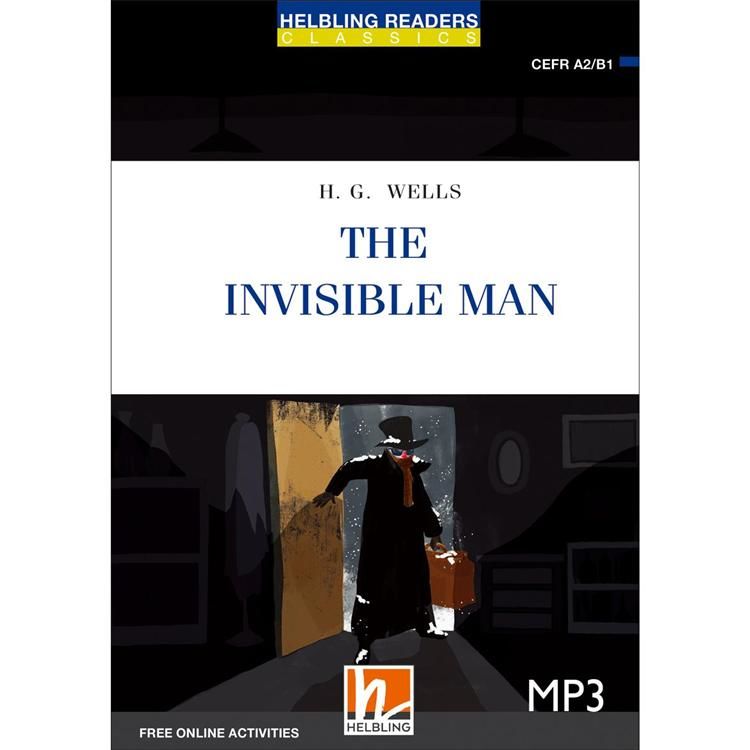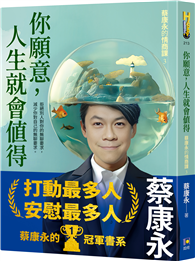| FindBook |
有 5 項符合
The Invisible Man(25K彩圖經典文學改寫+1 MP3)的圖書 |
 |
The Invisible Man(25K彩圖經典文學改寫+1 MP3) 作者:H. G. Wells原著、Donatella Velluti改寫 出版社:寂天文化事業股份有限公司 出版日期:2019-11-13 語言:繁體書 |
| 圖書選購 |
| 型式 | 價格 | 供應商 | 所屬目錄 | 二手書 |
$ 129 |
二手中文書 |
$ 213 |
語言 |
$ 220 |
中文書 |
$ 220 |
英文 |
$ 220 |
Others |
|---|
| 圖書館借閱 |
| 國家圖書館 | 全國圖書書目資訊網 | 國立公共資訊圖書館 | 電子書服務平台 | MetaCat 跨館整合查詢 |
| 臺北市立圖書館 | 新北市立圖書館 | 基隆市公共圖書館 | 桃園市立圖書館 | 新竹縣公共圖書館 |
| 苗栗縣立圖書館 | 臺中市立圖書館 | 彰化縣公共圖書館 | 南投縣文化局 | 雲林縣公共圖書館 |
| 嘉義縣圖書館 | 臺南市立圖書館 | 高雄市立圖書館 | 屏東縣公共圖書館 | 宜蘭縣公共圖書館 |
| 花蓮縣文化局 | 臺東縣文化處 |
|
|
本系列嶄新改版,書籍新增以下單元:
1. Characters(人物表):新增故事人物表,幫助掌握故事內容。
2. Fact File(真實檔案):針對故事背景與主題,介紹當時代的真實情況,主題廣泛,內容豐富,例如政治、國際局勢、社會、經濟、生活實境等,深入文化,擴大英語閱讀與字彙能力。
3. Life Skill(生活技能):針對故事內容,進一步提出生活技能的主題,將英語融入生活情境。
4. Cambridge English Exams(劍橋英語測驗):變化新題型,幫助活用英語,並提高應試能力。
內容簡介
英國小說家H. G.威爾斯(Herbert George Wells, 1866–1946)身兼新聞記者、政治家、社會學家、歷史學家等各種角色,學生時代學習過各種科學學科,擅長將科學知識通俗化,並用小說的方式呈現出來,堪稱近代科幻小說的始祖。
在現代,時光旅行、異形生物入侵地球等故事大行其道,早在1895年時,H. G.威爾斯所出版的第一部小說《時光機器》(The Time Machine),便以未來之旅為主題,這在當時是非常新穎的題材。
在第二部小說《隱形人》(The Invisible Man)當中,H. G.威爾斯更是創造了經典人物「隱形人」,時至今日仍激發著人們的奇幻想像。故事是以神祕陌生人於暴風雪中抵達英格蘭南部小村來開場,並探討科技發明面臨的一些難題。
H. G.威爾斯的小說很暢銷,有些甚至被改編成電影,深入描寫先進的科學技術所會帶來的衝擊和社會問題,對科幻小說的領域有著深刻的影響。他創新的主題,成為科幻小說的經典。他預言的科技躍進如今成真,例如太空旅行等,而月球背面的一個隕石坑還用他的名字來命名。除了科幻題材,H. G.威爾斯的作品也涉及社會正義、人權、道德、宗教等議題。
*********************************************
Today many people enjoy stories about time travel, invasions by strange beings from other planets, etc. But in 1895, when H. G. Wells published his first novel, The Time Machine, about a journey to the future, readers knew only two genres in fiction. One was realism, i.e. fiction about the real world (past or present), and the second was fantasy, i.e. fiction about impossible worlds, creatures and events. H. G. Wells (and Jules Verne), like the scientists in their stories, invented a new genre: science fiction. Science fiction is based on future developments in science and technology. The Time Machine was an instant success.
The late nineteenth century was a time of technological discoveries. These discoveries were suddenly changing society and the way people lived, and the changes were happening very quickly. New questions needed answers: what will be the effect of technology on society? Are scientists going too far? And above all: if something is technologically possible, should we automatically create it? Is there a danger that evil people will gain control of the new technology and use it to their advantage? In science fiction, writers and readers are able to explore their feelings about whether scientific advances are always good for people and the planet.
The Invisible Man, published in 1897, was H. G. Well's second science fiction novel. It starts with the arrival of a mysterious stranger in a small village in southern England during a snow storm, and explores some difficult questions about scientific inventions.
【Helbling文學讀本(Helbling Readers)簡介】
● Helbling Classics(經典英文文學改寫)
● Helbling Fiction(當代原創英文小說)
《Helbling文學讀本》為一套最優質的英文分級閱讀讀本,英語難易度由初級銜接到中級。在各項英語認證考試中,本系列書培養的英語能力級數如下:

全系列皆隨書附贈全文朗讀MP3。
內文編排精美,採用彩色印刷,全文穿插精美插圖,單元設計豐富。
除了精彩的小說之外,另編寫有:
1. About the Author(作者簡介):介紹作者,幫助認識創作背景。
2. About the Book(本書簡介):介紹故事內容概要,幫助了解故事的背景與旨意。
3. Before Reading(閱前活動):設計各種問題和活動,幫助暖身,啟發各種探討與學習。
4. After Reading(閱後練習):設計各種深入的問題和題目練習,幫助復習內容,加深英語的學習印象。
5. Test(測驗):有些讀本在閱畢之後,設計有各種測驗題目,包括文意測驗和英語練習等。
6. 隨文討論:在故事行文中,另設計有針對內文情節的問題探討,幫助做啟發性的思考。
7. 【新增】Characters(人物表):新增故事人物表,幫助掌握故事內容。
8. 【新增】Fact File(真實檔案):針對故事背景與主題,介紹當時代的真實情況,主題廣泛,內容豐富,例如政治、國際局勢、社會、經濟、生活實境等,深入文化,擴大英語閱讀與字彙能力。
9. 【新增】Life Skill(生活技能):針對故事內容,進一步提出生活技能的主題,將英語融入生活情境。
10. 【新增】Cambridge English Exams(劍橋英語測驗):變化新題型,幫助活用英語,並提高應試能力。
【本書錄音採用英式發音】
作者簡介:
H. G. Wells(H. G.威爾斯)
Herbert George Wells (or H. G. Wells) is considered, along with the French writer Jules Verne, to be the father of science fiction. He was born in Bromley, near London, in 1880, to a modest family. When he was eight, he broke his leg and was confined to bed for a long time. His father brought him books from the local library and he became a keen reader.
Due to his family's economic situation, Wells could not go to school, but he read and studied on his own. He became so proficient that a school offered him the position of student-teacher. This meant that he was able to pay for his own education by teaching younger pupils. He then went to Imperial College in London to study biology, and graduated in zoology at the University of London.
His novels have been hugely popular since their publication, and some of them have become films. He invented themes that became classic in science fiction. He also predicted technological developments that became reality, like space travel. A crater on the dark side of the Moon is named after him. Some of his stories are very realistic: Orson Welles’ radio adaptation of his novel The War of the Worlds convinced people that an invasion from Mars was really happening in New Jersey. He also wrote about social justice and human rights. H. G. Wells died in London in 1946, probably from a heart attack.
H. G.威爾斯和法國作家凡爾納(Jules Verne, 1828–1905),被世人並列為科幻小說的始祖。1880年,H. G.威爾斯生於倫敦近郊布朗利(Bromley)的一個中庸家庭。八歲時他不慎摔斷腿而長期臥床,父親便到當地的圖書館借書給他看,從此養成他求知若渴的閱讀習慣。
後來因家庭的經濟狀況供不起威爾斯去上學,他便自己閱讀與學習。他才智淵博,受聘於學校擔任課輔教師,藉由教導年輕學子而支付學費。他後來進入倫敦皇家理工學院攻讀生物學,畢業於倫敦大學的動物學系。
他的小說一出版就很暢銷,有些甚至被改編成電影。他創新的主題,成為科幻小說的經典。他曾經預言的科技躍進如今成真,譬如太空旅行等。月球背面的一個隕石坑還用他的名字來命名。
他筆下的故事非常真實,美國導演奧森.威爾斯(Orson Welles)曾經把他的小說《世界大戰》(The War of the Worlds)改編成廣播劇,讓大家還真的以為火星人入侵紐澤西。他的作品也涉及社會正義和人權等議題。
About the Book
FACT FILE: Mary Shelley’s Frankenstein
FACT FILE: What are you looking at?
Characters
Before Reading
1. The Strange Man’s Arrival
2. Mr Teddy Henfrey’s First Impressions
3. The Thousand and One Bottles
4. The Burglary at the Vicarage
5. The Furniture That Went Mad
6. The Unveiling of the Stranger
7. Mr Thomas Marvel
8. Mr Marvel’s Visit to Iping
9. The Invisible Man Loses His Temper
10. The Man Who Was Running
11. Doctor Kemp’s Visitor
12...
|











